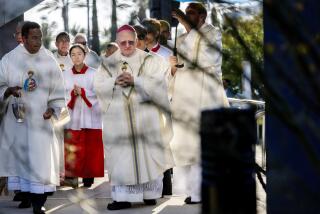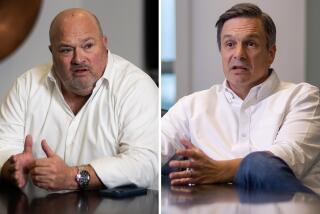Rector Ponders Next Move in IRS Showdown
The Rev. Ed Bacon is facing one of the biggest dilemmas of his ecclesiastical career: Should he turn over voluminous parish records demanded by the Internal Revenue Service, or resist and risk losing tax-exempt status for his church?
These equally tough prospects explain why Bacon spent all day Tuesday huddled in his wood-paneled office in the neo-Gothic All Saints Episcopal Church in Pasadena with attorneys and congregants, and in prayer.
The IRS is investigating whether the church engaged in improper campaigning before the 2004 presidential election -- a violation of federal tax law.
Leaning back in his chair and looking pensive but relaxed during a break in his tight schedule, Bacon said, “We’re not out to stick it to the feds. The issue here is for there to be communities of faith in this country who are not timid to express their point of view. And to elevate public discourse and interrupt moral bankruptcy.”
To understand how the tall, energetic 58-year-old former Baptist from the Deep South came to lead a liberal Episcopal church into a showdown with the IRS, it helps to know that he sees himself as something of a prophet along the lines of Isaiah and Jeremiah, in frequent communication with God.
When God speaks, Bacon said, “I listen closely, and take notes.”
Bacon is well known for championing liberal causes -- denouncing the war in Iraq, defending gay rights, supporting a growing role for women in the church. He’s also regarded by many as a skilled administrator. He is not shy about standing in the spotlight, and when he delivered a passionate sermon Sunday outlining the church’s predicament, TV cameras were rolling when he received a one-minute standing ovation.
Donald Miller, director of the School of Religion at USC, said Bacon has that “rare ability to be both pastor and prophet.... My own feeling is that the IRS could have chosen a weaker target.”
Bacon says one of his first encounters with the divine came when he was about 5 and playing alone in a pine grove behind his home and the Baptist church where his father was pastor in Macon, Ga. Suddenly, he was overwhelmed by a mysterious sense with a twofold message: You are the most beloved creature in all creation, and so is everyone else.
The experience, he recalled with a laugh, “opened me up to the phenomenon of paradox at a very early age. Years later, a student jokingly described it as ‘the theology of the multiplicity of superlatives.’ ”
His next major epiphany came while he was a student at Vanderbilt University Law School in Nashville and in the middle of an exam. A series of questions arose from his depths.
Are you an attorney?
“No,” he answered to himself silently.
Well, then, do you need a law degree?
“No.”
Well, then, do you need to finish this exam?
The answer seemed obvious. As Bacon recalled, “I walked. And it was the most liberating experience of my life.”
About the same time, Bacon made a difficult choice and persuaded his local draft board to grant him conscientious objector status. In lieu of military service during the Vietnam War, he worked with disabled children. In 1971, he was ordained a minister in the Gospel of Ministry of the Southern Baptist Convention, the same denomination as his father. It would take more than a decade to find his way to the more liberal Episcopal Church.
Reading the Roman Catholic monk and spiritual writer Thomas Merton, teaching the Bible and meeting with Episcopalians led Bacon and his wife, Hope, to join the Episcopal Church. He was ordained in the Sacred Order of Priests in 1983 and served in parishes in the South. After a two-year search, Bacon was chosen in 1995 to succeed the Rev. George F. Regas as rector of All Saints by a search committee that gave him high marks for his administrative experience, energetic worship, aggressive peace and justice agenda and his commitment to social justice programs.
“Many pastors are afraid to face the consequences of controversy,” said Regas, whose 25-minute politically tinged sermon sparked the IRS investigation. “Bacon is of that strand in the Bible that speaks of men and women who say no to what is wrong in society because they had a vision from God.”
The center of his life is his 35-year marriage to Hope, their two adult children and 2 1/2 -year-old granddaughter, and a daily prayer practice that begins about 4:30 a.m.
Lately, he’s been praying hard for guidance on how to proceed in his tangle with the IRS.
The IRS contends All Saints violated tax laws two days before the 2004 election by allowing Regas, who was a guest speaker, to deliver a sermon that was critical of Democratic presidential candidate John F. Kerry but heaped particular scorn on President Bush and the war in Iraq.
In a summons served Friday, the IRS ordered the church to hand over by Sept. 29 all the materials it produced in 2004 with possible political references, and for Bacon to appear before investigators Oct. 11.
If he declines, the matter will probably be referred to the U.S. Department of Justice and then, perhaps, to the U.S. District Court in Los Angeles. If that happens, the church might use the courtroom as a forum for its cause, Bacon said.
All Saints is one of dozens of churches -- liberal and conservative -- that have come under investigation by the IRS in recent years for alleged illegal politicking.
Tax law prohibits tax-exempt organizations, including churches, from endorsing or opposing candidates.
What has set the 3,500-member All Saints, the largest Episcopal congregation west of the Mississippi, apart from other churches targeted by the IRS has been its transparency. Instead of hiding his problems with the government, Bacon posts legal documents related to the case on the church website.
Almost overnight, Bacon has found himself surrounded by a growing and surprisingly diverse group of supporters. Congregants of synagogues and mosques have offered to become members of All Saints.
U.S. Rep. Walter B. Jones (R-N.C.), a self-described “conservative Catholic,” voiced his support. “What has happened to All Saints is a sad commentary on where we are headed in this country,” Jones said.
Bacon said he was leaning toward resisting the IRS request but said he was still sifting through more than 400 e-mails sent to him by parishioners about the issue.
Most urged the church to challenge the IRS, but many others said the church could still raise awareness of First Amendment rights while complying with the government’s request.
In the meantime, Bacon faced another nagging problem on Tuesday: finding the proper words for next Sunday’s sermon.
“These are such extraordinary times,” he said with a sigh.
*
(BEGIN TEXT OF INFOBOX)
Ed Bacon
Position: Rector of All Saints Episcopal Church in Pasadena.
Age: 58
Career highlights: Dean of Cathedral of St. Andrew in Jackson, Miss.; rector of St. Mark’s in Dalton, Ga.; dean of students and campus ministry, Mercer University in Macon, Ga.
Education: Mercer University, bachelor’s degree in English literature; Vanderbilt University School of Law, three semesters; Emory University, master of theological studies, doctoral work in theology and personality.
Source: All Saints Episcopal Church
More to Read
Sign up for Essential California
The most important California stories and recommendations in your inbox every morning.
You may occasionally receive promotional content from the Los Angeles Times.











